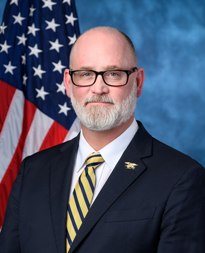Derrick Van Orden and a Brief Electoral History of Wisconsin Freshman US Reps
It’s been a half-century since the last time a 1st term Republican U.S. Representative lost their seat from the Badger State

That dropped the number of Democratic-held U.S. House seats in the state to just two – the lowest number for the party since the 83rd Congress when Democrats only won Clement Zablocki’s Milwaukee-area 4th CD in the 1952 election (and subsequently added the state’s west-central 9th CD in a special October 1953 contest after the death of Republican Merlin Hull).
But Wisconsin Democrats haven’t given up on the 3rd CD seat in 2024 yet, with Pfaff considering a rematch against Van Orden.
Freshman lawmakers – particularly in swing districts – tend to be the most vulnerable of incumbents, but how often have 1st term Wisconsin U.S. Representatives gone down in defeat?
Smart Politics examined the electoral history of the 187 men and women who have won elections to the office since statehood.
Of these 186 freshmen elected to the U.S. House prior to Van Orden, four died in office:
- Republican Luther Hanchett (1861-1862)
- Republican George Shaw (1893-1894)
- Republican Harry Griswold (1939)
- Republican Robert Henry (1945)
One congressman – Republican Hugh Price in 1887 – won a special election after the 1886 general election for the seat had already been conducted, so he was unable to run for another term as a sitting incumbent.
Seventeen other freshmen opted not to run for another term – most leaving public office entirely with a few running for the U.S. Senate (Republican Isaak Van Schaick in 1886, Democrat John Mitchell in 1892, and Democrat Howard McMurray in 1944).
Of the 164 remaining sitting freshmen who sought a second term since statehood, 129 were victorious, or 78.7 percent, with 35 losing their seats.
That percentage is very similar when compared to the last 100 years of elections – with freshmen victorious in 58 of 73 races (79.5 percent). Freshmen have fared slightly better over the last 50 years – winning 29 of 34 contests (85.3 percent) in the state.
The last freshman to lose a U.S. House seat in Wisconsin was Democrat Jay Johnson in 1998.
Johnson had won the open northeastern (Green Bay) 8th CD seat two years prior by 4.1 points over State Assembly Speaker (and future State Supreme Court Justice) David Prosser.
But in the 1998 midterms, Johnson became the only Democratic U.S. House Representative to lose a seat across the country, falling to Assemblyman Mark Green by 9.2 points.
Meanwhile, only one freshman Republican U.S. House member from Wisconsin has lost a reelection bid since the mid-1950s.
GOPer Harold Froelich was swept out of office amidst the post-Watergate Democratic wave in a rematch against his 1972 8th CD opponent Robert Cornell. [Cornell had lost by just 1.9 points in 1972 and flipped the seat by 8.8 points in 1974].
Each of the next 16 freshman Republicans elected to the U.S. House from Wisconsin since Froelich won second terms.
The remaining three freshmen to lose their seats over the last half-century are:
- Democrat Lynn Stalbaum in 1966 (1st CD)
- Democrat John Race in 1966 (6th CD)
- Democrat Peter Barca in 1994 (1st CD)
It should be noted that of the 35 freshmen who have lost their seats since statehood, five did so because they failed to win their party’s nomination:
- Democrat Lucas Miller in 1892
- Republican Clifford Randall in 1920
- Republican James Monahan in 1920
- Republican Merlin Hull in 1930
- Republican Thomas Amlie in 1932
However, none of those seats flipped that November.
Democrats held Miller’s 6th CD in 1892 (with nominee Owen Wells) perhaps in part because Miller abandoned an 11th hour independent campaign that might have split the party vote.
Republicans held Randall and Monahan’s 1st and 3rd CD seats in 1920 – with long-serving former U.S. Representatives Henry Cooper and John Nelson respectively winning back their party’s nomination (and their old seats) that cycle.
Republicans also held Hull’s 7th CD seat in 1930 (behind nominee Gardner Withrow) as well as Amlie’s 1st CD seat in 1932 (with George Blanchard).
Both Hull and Amlie would return to Congress running under the Progressive Party banner with Hull eventually returning to the GOP fold for the 1946 cycle.
Follow Smart Politics on Twitter.
